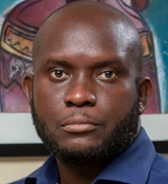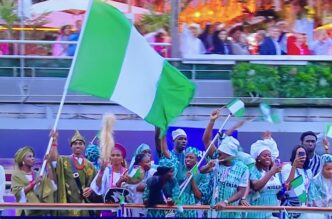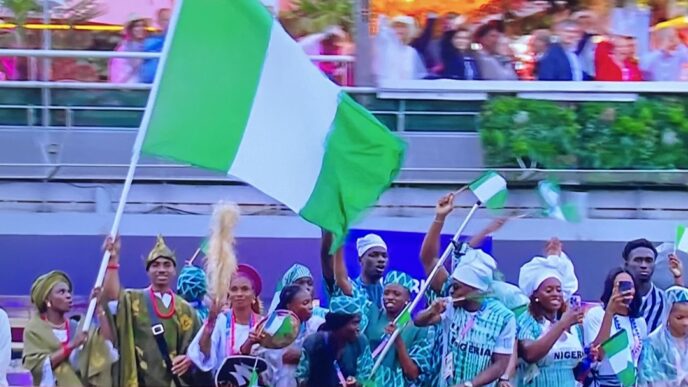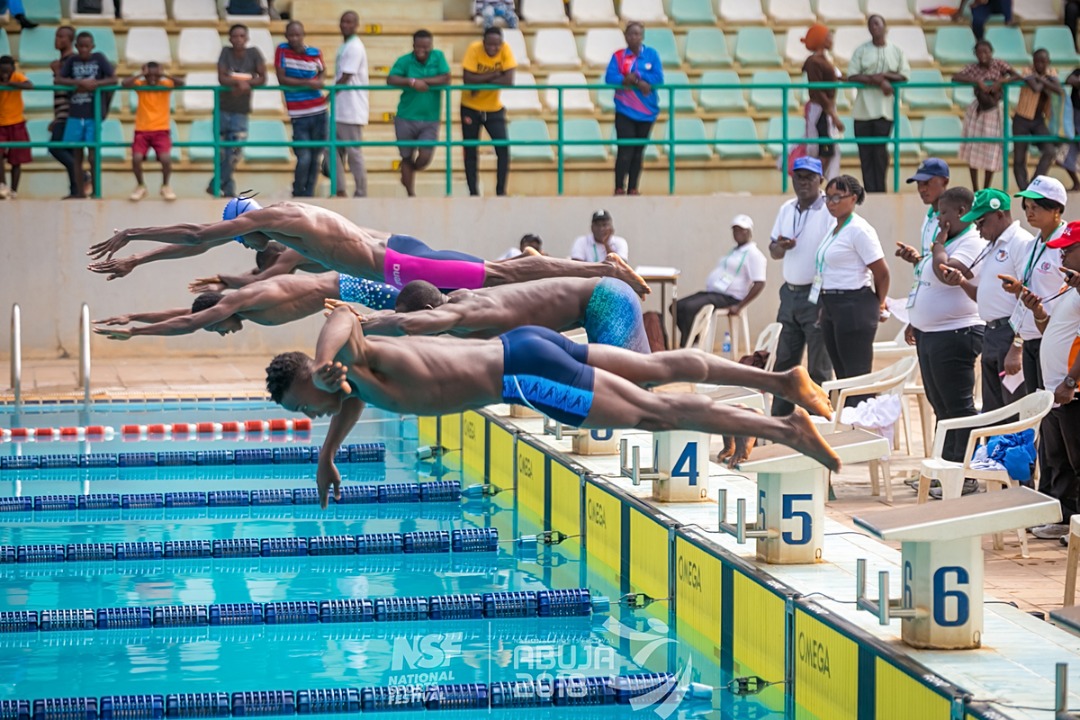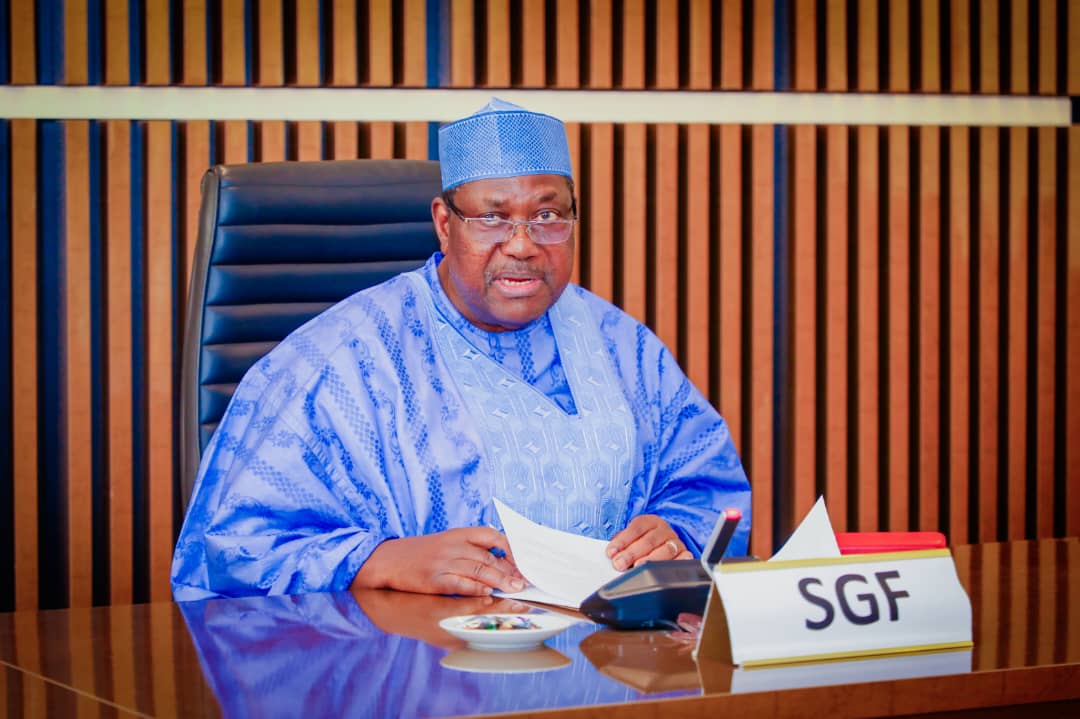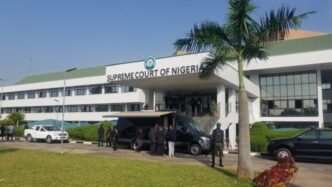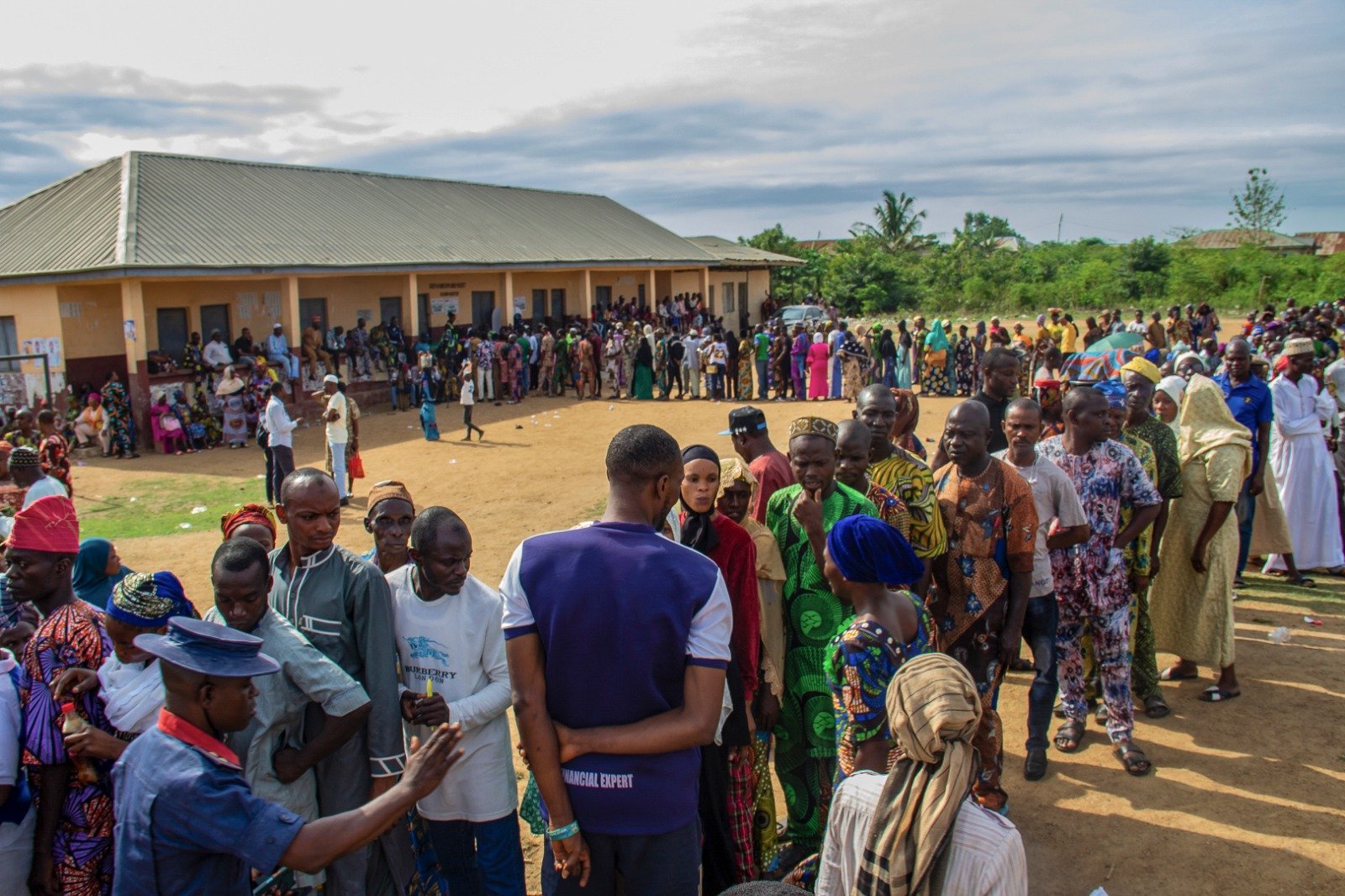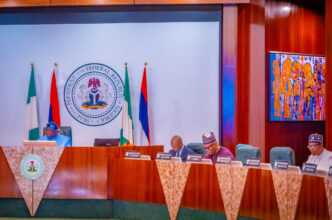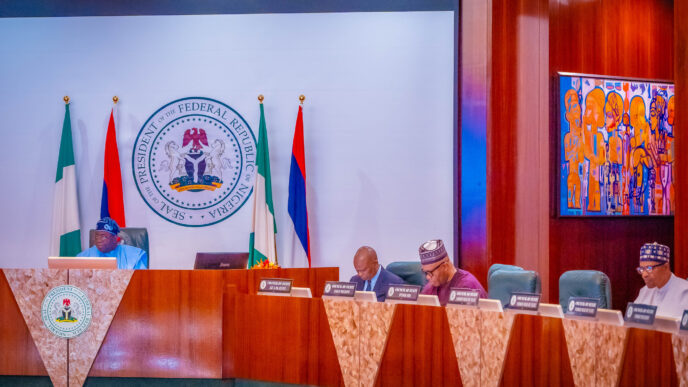File photo of Siminalayi Fubara, governor of Rivers (before the television microphones)
On August 1, 2024, the report of the Rivers State Economic and Investment Summit of May 22-23, 2024, was submitted to Governor Siminalayi Fubara of Rivers state. While the details of the report can be projected based on events at the summit, a contemporary analysis of the state’s situation may support some additional input towards Governor Fubara’s aspiration to make the state Nigeria’s leading economic subnational location. His expressions while receiving the report, as well as during the summit, underscore his burning desire to significantly develop the economy of Rivers state- while he continues to manage somewhat difficult political risks.
With an estimated population of 7.4 million people and gross domestic product of $28.4 billion, the state’s economy ranks among the top 25 economies in Africa, with comparison to countries such as Rwanda, Botswana and Gabon. The state also accounts for over 40 percent of Nigeria’s onshore crude oil production, and almost all of its liquified natural gas. Given that petroleum accounts for about 80 percent of Nigeria’s foreign exchange earnings and over 60 percent of non-debt revenue, one can casually assume that all is well with the economy of the state, and that Governor Fubara has no need to complain. But the fact that the Trans-Amadi Industrial Layout of the state has witnessed significant decline over the years, with major companies and industrial concerns also relocating from the state, is an indicator of the economic challenges that the governor is desirous of addressing.
A causal relationship can be established between the 2012 decision of International Oil Companies (IOCs), to reduce certain investments in Nigeria, especially divesting from onshore assets, and the decline of Trans-Amadi Industrial Layout. As a result of this decision by Shell, ConocoPhillips, TotalEnergies, ExxonMobil, Chevron and Eni, capital spending in the country’s oil and gas industry significantly reduced by 70 percent year-on-year, from $20 billion to $6 billion per annum as at 2022, leading to a decline in oil production to 1 million barrels per day (bpd) in current times, from the 2.6 million bpd in the last 20 to 30 years. With Rivers state accounting for over 40 percent of Nigeria’s onshore crude oil production, this drastic reduction in onshore investment by IOCs has had a significant detrimental impact on the economy of the state. Oil servicing firms and other economic concerns that were part of the onshore oil ecosystem, such as those at Trans-Amadi Industrial Layout, have had to close down operations and lay-off workers, fostering a negative economic cycle in the state.
The decision of Governor Fubara and the state government to organize the economic and investment summit, is therefore a strategic effort at addressing the state’s structural economic challenge, given its extraneous source from the foreign headquarters of IOCs. Also, the approval by the Rivers State Executive Council on October 27, 2023 of four draft bills, which are, The New Towns Development Authority Bill; Rivers Youth Entrepreneurship Bill; Rivers State Investment Promotion; and Rivers State Power Sector Regulatory Commission; may provide some legal framework for the structural economic adjustment that the state needs, to meet the contemporary economic goals and aspirations of Governor Fubara.
Advertisement
Such a structural economic adjustment plan may have some institutions and persons and critical success factors. They include African Export-Import (AFREXIM) Bank headed by Prof. Okey Oramah, Atedo Peterside and Arc. Tonye Cole. And this strategic framework of collaboration is not uncommon for such economic vision. The United States of America (USA), the world’s largest economy, attained its economic position due to key contributions of private sector operators such as Cornelius Vanderbilt, John D. Rockefeller, Andrew Carnegie, J. P. Morgan, and Henry Ford.
As part of its mandate towards enhancing export trade and development in Africa, Afreximbank also provides project preparation and advisory services, including a potential financing programme that enhances feasibility plans, for subnational governments. These technical services can support the state in reattracting foreign capital, while also reversing the trend where the leadership of major petroleum companies and technology firms with major presence in the state, operate from other states and locations outside Rivers State, leading to capital flight. The multilateral bank also can also operationalize African Sub-Sovereign Governments Network (AfSNET) for the state, which is a platform for sub-sovereign governments throughout Africa to promote economic development and encourage intra-African trade and investment. AfSNET supports collaboration between the public and private sectors, facilitates peer learning, and enables Afreximbank to take its products and services to the grassroots, where trade and investment actually take place. Prof. Okey Oramah, the President of Afreximbank has provided support to some willing Nigerian state governments, and should be willing to provide similar support to Governor Fubara, that can include long-term infrastructure financing.
Given his documented phenomenal strides in the establishment and growth of Stanbic IBTC in Nigeria, Atedo Peterside is an almost perfect fit in the drive towards entrepreneurial development and promotion in the state. In principle, Peterside is the ideal role model of the type of entrepreneurs, who understand contemporary domestic and global economic trends and geopolitical opportunities, that Fubara wants to groom in the state. That he recently retired from activities of the international bank, and is visibly in good health, should provide him with adequate time and commitment in nurturing and mentoring several new businesses that will sustain the desired level of economic activities in the state. He should be able to provide entrepreneurs in the state with the financial, social and management skills to harness business opportunities within and outside of the state, as global geopolitics also leads to changes in the international economic order. An institutional framework that can feasibly support this envisaged task for Mr. Peterside, can be the establishment of a Rivers State Business School. As the Visitor of the Rivers State University, Governor Fubara should be able to facilitate the accreditation of the proposed school, for optimal performance. Atedo Peterside can harness his networks in the international financial system, to attract foreign capital into the state.
Advertisement
Tonye Cole, an architect and co-founder of Sahara Group, is another critical human development stakeholder for the state-if well harnessed. The political realities after two gubernatorial attempts, suggest that his gubernatorial political inclinations are no more active, making him concentrate more on economic activities. As electricity is now on Concurrent Legislative List, Sahara Group’s experience in power generation and electricity management will be handy in ensuring that operators in a revived Trans-Amadi Industrial Layout, entrepreneurs, and other new investors have adequate electricity for their economic operations. With Fubara establishing a proposed Rivers State Petroleum Corporation (RSPC), Cole’s experience will be handy, given the domestic and international exploits of Sahara Group. The RSPC should be involved in the construction of modular refineries in the state and Niger Delta region. This ensures that in addition to creation of high-income jobs, environmental quality is also improved upon, as those involved in illegal oil bunkering that damages the environment, will be provided legitimate employment platforms.
While Governor Fubara does the political heavy lifting to secure concessionary oil and refinery licenses from the federal government for RSPC, especially for underutilized fields in the state, Tonye Cole, as an accredited economic diplomat of the state, will deploy his industry leadership experience in seeking viable partnerships that enable maximal utilization of such assets, for high-income job creation and expanded revenue earnings for the state. The state’s equity contribution will be the securing of licenses and addressing community and social issues that have impeded operations in the past, while the properly selected partners deploy capital and technology as their equity. Tonye Cole’s appointment to the World Bank Expert Advisory Council on Citizen Engagement, his political experience after two gubernatorial campaigns that gives him state wide community experience, his roots in riverine parts of the state that are oil bearing, plus his global expertise and knowledge, should enable him leverage contemporary geopolitics to attract additional international firms from emerging markets such as Brazil, to invest in not just the energy sector, but also in renewables, tourism, agriculture and other sectors with investment potentials in the state.
With Fubara working with Oramah, Peterside and Cole as economic diplomats for the state, the state will develop structured relationship with IOCs, for efficient management of economic relations that enables more foreign direct investment (FDI) in the state. With that, organisations considering divesting form the state will be engaged in a manner that rather encourages them to invest more in the state. The significant social investments by Governor Fubara in healthcare, education, peacebuilding and civil infrastructure across the state, will substantially complement these envisaged economic propositions.
Over 90 percent of global trade is maritime based, which makes maritime activities key to any feasible economic plan. There has been an increase in maritime activities at Port Harcourt and Onne ports during and after the tenure of a former governor of the state, as Minister of Transport between 2015 and 2022, though a lot more could have been achieved if the needed political collaboration was available. However, the proposed Bonny Seaport is designed for private sector funding. The state government and her economic diplomats can therefore facilitate funding for the project as a modern automated port, with partners such as Afreximbank- with the state government as shareholder. With the Bonny-Bodo road nearing completion, transport linkages between the Bonny port and the existing Port Harcourt-Maiduguri rail line being rehabilitated, will make the port more viable by providing economic services to Nigeria’s North Central, North East, and landlocked countries such as Niger Republic and Republic of Chad.
Advertisement
These propositions and Governor Fubara’s economic aspirations may not be easy to attain, but can be achieved with strategic planning and persistence. And the relatively recent visits by official British and German delegations to the governor, are evidence of the state’s enduring economic prospects and international investment attractiveness, which should be adequately harnessed. The British High Commissioner who called on the governor on January 24, 2024, reiterated the enduring interest of the British financial sector and other sectors, in doing business in Rivers state. Also, the Vice Consul-General of Germany to Nigeria, Mr. Jochen Schindelarz and a business delegation of the German Chamber of Industry and Commerce visited Governor Fubara on February 9, 2024, where they highlighted their interest to invest in the state. Harnessing these prospects and translating them to tangible economic and investment outcomes, are tasks for Fubara, Oramah, Peterside and Cole.
In a time of dynamic global geopolitical changes such as the emergence of BRICS countries, changes to G7, and other regional tensions, Governor Fubara will need new thinking and geopolitical awareness, for the design and implementation of a new development pathway. This envisioned new economic model, with collaboration of institutions such as Afreximbank, plus economic diplomats such as Prof. Okey Oramah, Atedo Peterside and Tonye Cole- similar to the USA with the contributions of Cornelius Vanderbilt, John D. Rockefeller, Andrew Carnegie, J. P. Morgan, and Henry Ford, will hopefully address the exclusion concerns that led to agitations under the previous economic order. As a son of Opobo land, Siminalayi Fubara is bound to have a somewhat sociocultural and genealogical awareness of what international geopolitics portends for strategic economic development, given the globally documented business exploits of King Jaja of Opobo in pre-colonial times. If King Jaja could position Opobo as a major location for international economic activities, then Governor Fubara, a trained financial expert, can accomplish his expanded economic vision for Rivers state in contemporary times.
Dr. Uwanaka writes from African University of Science and Technology, Abuja. [email protected]
Advertisement
Views expressed by contributors are strictly personal and not of TheCable.
Add a comment
